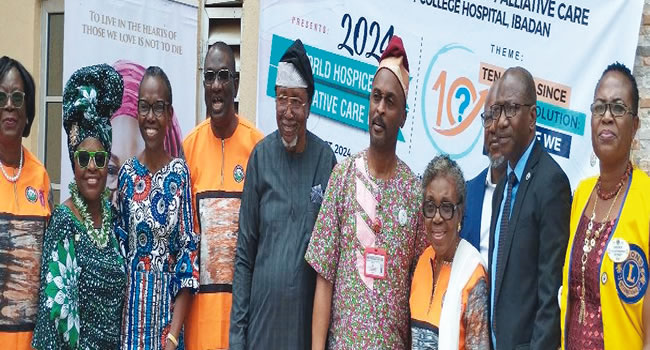In an audit of ten years of hospice and palliative care in Nigeria, stakeholders stated that too many people in need of these services do not have access to them because they are either unaware of their availability or cannot access them.
The stakeholders, who spoke during the 2024 World Hospital and Palliative Care Day at the University College Hospital, Ibadan said that hospice and palliative care is an important part of the spectrum of care for chronic and terminal illnesses like cancer and stroke but it is underestimated, widely unavailable, and stigmatised due to misconceptions about palliative care.
Speaking at the event, the provost of the University of Ibadan College Of Medicine, Professor Temidayo Ogundiran, stated that palliative care is underestimated and patients who require it have poor access to its services because health care in Nigeria is primarily paid for out of pocket.

Ogundiran, represented by Professor Babatunde Osinaike stated that medications and medicine that are being used, especially opioid medications, should be made available regularly, even as hospice and palliative care services should be included in the health insurance programme.
To guarantee that this area of medicine helps treat people in Nigeria who have terminal illnesses, he called on the government to support and train additional medical experts in hospice and palliative care.
Mrs Temituope Oluwatukesi, the proprietress of Newspring Group of Schools, Ring Road, Ibadan, said in a keynote address that emotional and psychological support is just as crucial as physical care for a person with a terminal illness, and it is the basis of palliative care.
According to her, the end of life for those with cancer is stigmatized even though palliative and hospice care helps give patients with terminal illnesses control over how they live the remainder of their lives.

She added that these services are not widely available and that talking about death is taboo, making it difficult to have open conversations about end-of-life care.
Mrs Oluwatukesi declared: “What happened with my brother-in-law cannot be compared with what happened to my father when he had end-stage cancer and entered hospice care in 2019. It was like comparing light with darkness. My brother-in-law suffered.
“Palliative and hospice care matter; it offers hope to patients and families facing the most difficult times in their lives. So, whether you’re a healthcare provider, a policymaker, a community leader, or a family member, we must work together to ensure that palliative and hospice care are not just options for the few but a reality for everyone who needs them.”
Professor Ike Oluwapo Ajayi, the director of the Institute for Advanced Medical Research and Training (IAMRAT), stated that research is an essential component of palliative care delivery worldwide and that Nigeria, in particular, needs more research to produce data for ongoing improvements in its palliative care system.
Professor Ajayi stated that funding and a supportive atmosphere from the government, organisations, and grant organisations are necessary.
A deputy director of nursing, Mrs Oluwakemi Oyekola, stated that the Department of Hospice and Palliative Care, which started as a unit in 2007, in the last 10 years had enrolled 1,590 patients for these services, the majority of whom are adult cancer patients. Some also suffered from sickle cell disease, stroke, and organ failure, among other chronic conditions.
Mrs Oyekola said there is a misconception about palliative care, especially among healthcare, and many physicians believe that palliative care is only about the end of life and so refer patients who need the service when they are gasping or at the point of death after spending several months on hospital beds.
At the celebration, the late Professor Simbo Amanor-Boadu, represented by her son, Mr Kwesi Adetola Amanor-Boadu; the president of Ibadan College of Medicine Alumni Association Worldwide (ICOMAA WW), Professor Emmanuel Otolorin; and the president of the Centre for Palliative Care, Nigeria (CPCN), Professor Olaitan Soyannwo, were given awards for their contributions to palliative care in Nigeria.
READ ALSO: Fuel hike: Tinubu’s govt insensitive to Nigerians’ plight — Obi







